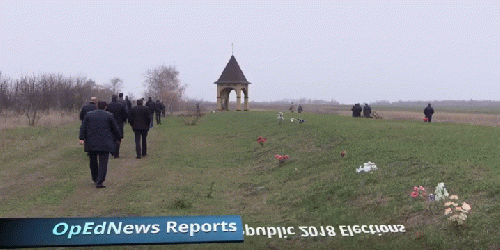An interview with Russia's UN Rep and Lugansk Republic's Foreign Ministry detailing what's ahead and what this means for the Minsk Agreements.
On November 11, 2018, I was in Lugansk People's Republic (LNR)as an election observer for the national election along with people from twenty-two countries. The elections in Lugansk and Donetsk People's Republics (DNR)were necessary because of the assassination of DNR's Head of the Administration Alexandr Zakharchenko and the resignation of LNR's former Head of the Administration Igor Plotnitsky.
In the run up to the election and following it I was privileged to be able to interview diplomats from the Russian Federation and Lugansk People's Republic. I took statements from the Deputy Foreign Minister in LNR, an OSCE election observer who was on his way to monitor the US mid-terms, and the mayor of Stakhanov which is a city in LNR.
The real questions revolve around what the elections mean to each party in the scope of their work? And how will this affect the Minsk peace negotiations going forward?
The elections themselves had the power to make or break the new republics. If the turnout was low, it would have meant that people voted no confidence in the young states and would have signaled they were failing.
Instead, the voter turnout is among the highest recorded anywhere in recent memory. Lugansk People's Republic had a 77% voter turnout and DNR came in with 80%.
Instead of the election outcome being determined by the results, this election is getting parsed by commas and period placement. While no one is actually arguing whether the election was legal or not, Ukraine is arguing its legitimacy, ie, it may be legal but it's not right to do.
Ukraine and LDNR (Lugansk and Donetsk Republics )only have one mechanism to communicate and negotiate through. The result of that is what the Minsk agreements embody. Minsk II makes the only reference to elections agreed to by all parties.
Ukraine has the right to regulate local elections in LDNR. This gives the Ukrainian government control over how city and town elections are run inside Lugansk and Donetsk Republics. Ukraine decides what determines a legitimate election (procedure and methodology) and what's not legal according to Ukrainian law.
Notice the parsing between legitimate (authentic) and legal or according to Ukrainian law. This parsing represents the arguments made about the election.
The principle involved is the same as a government assuming a power because it isn't forbidden in the Constitution. This is done all the time and is considered normal. It's also why restrictions are placed on government powers in democratic societies.
Since the Minsk Agreements don't specify for Ukraine to regulate the national elections, LDNR rightfully assume the authority to do so. This is against the backdrop of DNR Head Zakharchenko's assassins admitting they were working for Ukraine.
What does that mean going forward? Well, for international bodies that election and everything resulting from it will mean different things depending on what their mandate is. I was able to put these questions to an OSCE Election Observer on his way to monitor the US midterm elections. This is what he could say:
"The OSCE can only observe an election if it is invited to do so by an OSCE participating State, so any statements from the OSCE would not comment on any procedural aspects of the elections. The OSCE only observes elections when they are invited by the internationally recognized government, which in this case would be the authorities in Kyiv, and since the Ukrainian government denounces the Donbas elections as illegitimate, it is not inviting the OSCE to observe. Therefore the OSCE will not be monitoring and will not comment on the procedural aspects."
As you can see, it isn't legality that is questioned. It's legitimacy because Kiev questions it. They didn't cover the point in negotiations with LDNR. It's procedure, or how the election will be done which is administrative detail. And lastly, it is the lack of an internationally recognized government invitation.
Next Page 1 | 2 | 3 | 4 | 5 | 6
(Note: You can view every article as one long page if you sign up as an Advocate Member, or higher).






